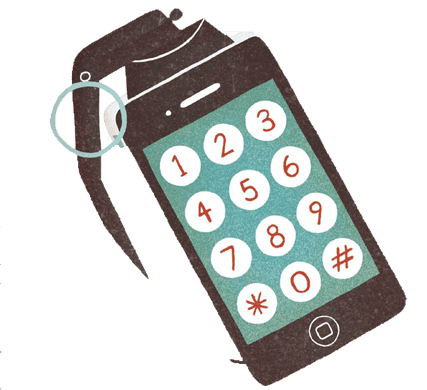 (Illustration by Jacob Stead)
(Illustration by Jacob Stead)
From texting to Twitter, modern communication technologies have garnered plenty of buzz for their potential to improve transparency and political accountability. But new research shows such technologies can be powerful tools for change in more ways than one. In Africa, at least, “the expansion of cellphone coverage goes hand in hand with more violent events,” says Florian Hollenbach, a doctoral candidate in political science at Duke University.
Cell-phone coverage spread rapidly across the continent of Africa over the past 20 years. And political violence has often followed in its wake, according to Hollenbach and Jan Pierskalla, a postdoctoral candidate at the German Institute of Global and Area Studies, who co-authored a recent study on this subject. In 2008, for instance, organized violent conflict was more likely to unfold in areas where coverage had existed in 2007 than in areas where it hadn’t. The overlap between cell-phone coverage and conflict is especially clear in Algeria, the Democratic Republic of Congo, Kenya, Nigeria, Uganda, and Zimbabwe. (To track the incidence of political violence, the researchers drew on the Uppsala Conflict Data Program, a widely recognized source for such information.) Data for subsequent years confirm the pattern—a pattern that is not just a by-product of (for example) income level, population density, ethnic tension, or the distribution of natural resources such as diamonds, gas, and oil.
Instead, Hollenbach speculates, what explains this pattern is the removal of barriers to violent action. Good communication enables rebel networks to become more tightly integrated and to share information more quickly. It’s not that mobile technology will suddenly make a peaceful group turn violent. Instead, Hollenbach explains, “there’s already the motivation for conflict, and with the expansion of cell-phone coverage, [rebel groups] may be better able to organize. Fighting then becomes more likely.”
That finding would come as no surprise to government leaders who have tried to restrict access to mobile technology. (Witness the Mozambique government’s attempt to block text-message traffic during protests in 2010, or the shutdown of cell-phone service in Mubarak’s Egypt in 2011.) Still, this study offers some of the first empirical research on the question of how modern communication technology helps shape political circumstances. “This is a much-needed development,” says Nils Weidmann, a political scientist at the University of Konstanz in Germany. Too many people have declared cell phones and the like to be “liberation technologies,” he suggests. “They say, essentially, [that these tools] have unconditionally beneficial effects,” Weidmann says. “That needs some further scrutiny.”
The final word on the subject is not yet in. Although the research in Africa shows that cell-phone coverage increases political violence, Weidmann’s own work in Iraq yielded the opposite conclusion. “As you set up [cell] towers [in Iraq], the violence in a district or in the vicinity of a tower essentially goes down,” Weidmann says. The contrast between these findings may reflect the different context in each case. Or it may reflect a difference in the methods used in the two studies. Information on violence in Iraq came directly from US-led coalition forces, for example, whereas information on violence in Africa came primarily from news reports. One of those information sources, Weidmann suggests, is likely to be more limited than the other. “You’re not going to learn about violence that happened outside the [cell-phone] coverage area [in Africa], because no reporter was there,” he says. “A lot more research is needed on this topic.”
Support SSIR’s coverage of cross-sector solutions to global challenges.
Help us further the reach of innovative ideas. Donate today.
Read more stories by Jessica Ruvinsky.

